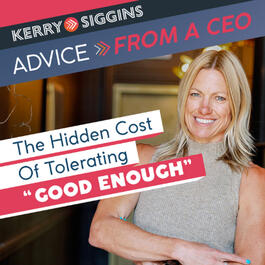
Podcast_The Hidden Cost of Tolerating ‘Good Enough’Reflect Forward Podcast Kerry Siggins
Complacency is the slow death of leadership. When we tolerate “good enough,” we quietly set the ceiling for our team’s potential—and our own. When you say “good enough” is acceptable, you erode excellence. You send the message that mediocrity is tolerated, and that message ripples across culture, morale, and results. People disengage. Teams plateau. Opportunities slip away. As Jim Collins reminds us: “Good is the enemy of great.” And Gallup’s research backs it up: only about 2 in 10 employees strongly agree that their performance is managed in a way that motivates them to do outstanding work. That’s what happens when leaders accept mediocrity instead of inspiring excellence. The good news is that raising the bar doesn’t mean driving people to exhaustion. Excellence isn’t about perfection; it’s about clarity, ownership, and progress. As Brené Brown says, “Clear is kind. Unclear is unkind.” When leaders clearly define expectations, celebrate growth, and model accountability, teams rise to meet higher standards. And it starts with us. We can’t expect our people to reject complacency if we’re coasting ourselves. Abraham Lincoln put it simply: “Whatever you are, be a good one.” Holding ourselves accountable to higher standards inspires trust, builds credibility, and makes excellence contagious. In this episode of Reflect Forward, I introduce a tool I call the Ownership Audit, a quarterly practice designed to identify and eliminate complacency within yourself, your team, and your organization. I’ll walk you through how to use it to ask the hard questions, check for alignment with your mission and values, and take courageous action when “good enough” has crept in. Because the truth is, mediocrity doesn’t just cost culture, it costs money. McKinsey research shows that companies with high-performance cultures are 3.7 times more likely to be top financial performers. Steve Jobs once said, “Be a yardstick of quality. Some people aren’t used to an environment where excellence is expected.” As leaders, we must become that yardstick. We must model what it looks like to expect and deliver excellence, not perfection, but the commitment to always do better. Mic Drop Moments • “Complacency is the slow death of leadership.” • “When leaders tolerate ‘good enough,’ they set the ceiling for their team’s potential.” • “Mediocrity doesn’t just cost culture; it costs money.” • “Excellence isn’t perfection; it’s clarity and ownership.” • “If you tolerate average, you’ll never unlock extraordinary.” Key Takeaways 1. Tolerating “good enough” erodes both culture and results. 2. Complacency spreads like a virus; leaders set the bar. 3. Raising standards is about clarity and compassion, not perfection. 4. The Ownership Audit helps leaders spot and eliminate mediocrity. 5. Holding yourself accountable to higher standards inspires trust, energizes your team, and keeps complacency from creeping in. Timestamps • 00:00 – Why “good enough” is dangerous • 02:05 – The StoneAge story: breaking the dealer model • 08:42 – The psychology of “good enough” • 12:30 – The ripple effect of complacency • 16:10 – Raising standards without burnout • 21:18 – Holding yourself accountable • 27:45 – The Ownership Audit framework • 35:10 – Closing thoughts and call to action Connect with Kerry Don’t forget to subscribe to Reflect Forward on your favorite podcast platform or YouTube. Visit my website, kerrysiggins.com, to explore my book, The Ownership Mindset, and get more leadership resources. Let’s connect on LinkedIn, Instagram, or TikTok! Find Reflect Forward on YouTube: https://www.youtube.com/@kerrysiggins-reflectforward Find out more about my book here: https://kerrysiggins.com/the-ownership-mindset/ Connect with me on LinkedIn: https://www.linkedin.com/in/kerry-siggins/
From "Reflect Forward"


Comments
Add comment Feedback